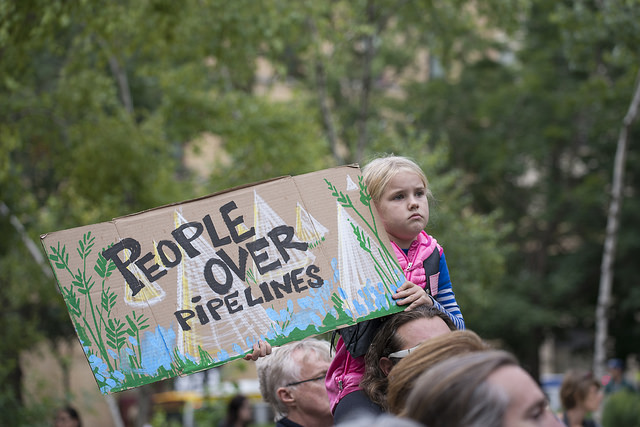Dakota Access Pipeline construction stopped for further environmental evaluation
Thousands of protesters, clad in traditional tribal wear, gather in North Dakota. Many hold signs that say “Respect our water,” and ‘Water is life,” among others. They are there to defend the Standing Rock Sioux reservation from Energy Transfer Partners’ oil pipeline.
Planned since 2007, the Dakota Access pipeline is a $3.8 billion project set to span 1,172 miles. If carried out, the pipeline will carry approximately 500,000 barrels of oil per day from North Dakota to Illinois. It was proposed to cross the Missouri River at one point, but that suggestion was turned down.
Energy Transfer states that pipelines are the safest and most efficient means of transporting oil. Members of the Standing Rock Sioux tribe, however, are extremely worried about the impacts the pipeline will have on their water supply. One activist declared that it could be potentially catastrophic.
However, on Friday, President Obama called for a temporary halt in pipeline construction, while the federal approval documents for the pipe are reviewed. This will show if the Dakota Access is actually lawful. This decision came directly after a judge gave the go-ahead for construction. Many natives feel this is not a win, but that progress is being made.
Many political leaders have stood with the protestors. Senator Bernie Sanders led a demonstration against the pipeline in front of the White House, and Green Party presidential candidate Jill Stein has announced her support, going so far as to graffiti her protest on a construction vehicle.
Environmental science instructor Jill Irvin explained that she has “friends that are actually there protesting,” and that since she is from South Dakota, this is very significant to her. She described the situation as “tragic.” She described how the Ogallala aquifer there “provides fresh water to millions of people.” Irvin went on to explain that pipelines put above aquifers have the potential to contaminate water, and that it is extremely difficult to clean up oil spills, especially underground.
The federal government and Native American leaders are set to meet later this fall to discuss how the Dakota Access pipeline will affect reservations. Protesters have announced their plans to remain until construction is stopped for good.

Courtney Page is a senior at Perry High. She enjoys writing for journalism, and plans to major in journalism and minor in women's studies at San Francisco...







jessica • Oct 19, 2016 at 8:37 PM
I mostly agree, two very enthusiastic thumbs up. fine holiday fun